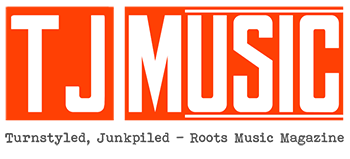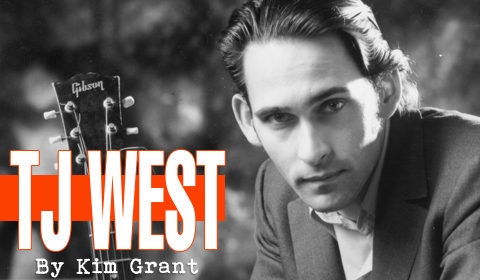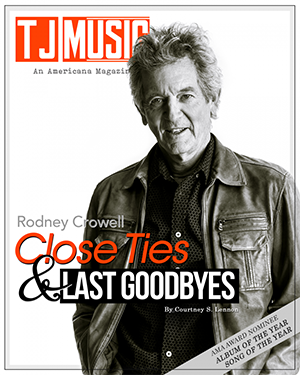TJ WEST: Rockin’ Johnny Burgin
By Kim Grant
It was only recently that I became acquainted with Rockin’ Johnny, the “Modern King of the West Side Chicago Blues Guitar.” I was having an email exchange with an old friend from Illinois, Tom Irwin (a fantastic musician in his own right—just Google Tom Irwin Sangamon Songs), when he mentioned that he had good friend and amazing old school blues guitarist headed my way and that I should check him out. Being from Chicago, my curiosity was piqued.
Alas, Johnny Burgin had just played Los Angeles for his good friend (and tireless LA blues promoter and musician), Cadillac Zack. His next tour dates are in Northern California and kick off on December 4th. This time around I won’t get to see him bring Chicago blues to the west coast, but I was happy to make his acquaintance and learn about his music.
Burgin created a buzz in Chicago in the 90’s playing with blues singer Taildragger, and then began touring nationally as a sideman with former Howlin’ Wolf drummer Sam Lay and blues piano legend Pinetop Perkins (among many others). After taking a long hiatus from his career to be a husband and father, Burgin returned to the stage and came back strong, playing festivals and gigging all over the world. When I first reached out to him, he had just arrived in Japan to play.
You are based out of Chicago, is that where you grew up?
I was raised in Starkville, Mississippi; my dad is from there and my mother was from McComb, MS. I finished high school in Greenville, SC and moved to Chicago in ’88. Except for a couple of years in Rockford IL during the time I was off the music scene, I have lived in or around Chicago ever since.
How old were you when you picked up your first guitar?
Sixteen. My mother got me a red Rickenbacker solid body with one pickup and a shorter neck, I think it was a 420. I played it for years and it’s on the cover of my first CD, Straight Out of Chicago on Delmark Records.
Who are some of your influences?
Magic Sam, Jimmy Reed, Willie James Lyons, Luther Tucker, Johnny B Moore and most of all, Earl Hooker. I’m also crazy about Django Rheinhart, which is another ball of wax.
Who are some of the people you’ve played with?
Taildragger, Big Wheeler, Big Smokey Smothers, Jimmy Lee Robinson, Paul DeLay, Mary Lane, Jimmy Burns, Little Arthur Duncan, Little Mack Simmons. In the 90s I was playing with so many of those of those guys all the time. Only Taildragger, Jimmy Burns and Mary Lane are still with us. I still work with Taildragger and Mary Lane sometimes.
How did you get the name,”Rockin’ Johnny?”
I was on the college radio station at University of Chicago (WHPK) so I thought (my DJ name) should be Rockin’ Johnny. I was actually thinking about Good Rockin’ Charles when I started with that name.
You are identified with Chicago blues music. How does that compare with Delta blues, Gospel blues or even blues-rock?
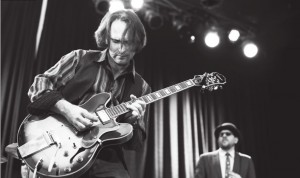 It’s its own tradition. I love it the best and when it’s good I just feel like it’s the best music in the world. It has a harder edge to it that comes from the struggle to get by in the big city. Delta blues is more deeply southern which is also great but something happened in Chicago that was great. I’m not a blues-rock person at all. It just doesn’t do it for me. Really, although I’ve spent so many years playing guitar, blues-rock has too much guitar for me.
It’s its own tradition. I love it the best and when it’s good I just feel like it’s the best music in the world. It has a harder edge to it that comes from the struggle to get by in the big city. Delta blues is more deeply southern which is also great but something happened in Chicago that was great. I’m not a blues-rock person at all. It just doesn’t do it for me. Really, although I’ve spent so many years playing guitar, blues-rock has too much guitar for me.
Are you a purist?
No. Neither were the creators of all this great music I love. But good blues is a conservative style of music, it’s a tradition and it should be recognizable, or its something else that I might not like as much, and neither would my audience. They want the music that trips their trigger. I play in venues all over and all up and down the socio economic ladder like a lot of working musicians do, and I need something for everybody. I enjoy that and I have songs for all kinds of folks and all kinds of situations. But I want my blues to feel and sound like blues, just like a great wine from a certain place should have a certain taste satisfaction to it.
Where do you go to hear the real stuff in Chicago and whom should we be listening to (Besides you, of course)?
The south and west side scenes are not as great as they used to be by a long shot, I hardly go there anymore, and the black clubs on the west side is where I learned how to play– Taildragger, Johnny B Moore and many other great players, and most of all, the audience taught me!
Look for Mary Lane, she is a truly real deal blues singer who sings around town and sang with Robert Nighthawk and Elmore James! There is a good crop of 30-year-old players now developing which is encouraging to see. I would also check out Smilin’ Bobby who sings on the south side and also up in Milwaukee. Jimmy Burns is active still and is a great singer. Jimmy Nick is a young guy in the northwest burbs who is very entertaining and a fiery showman. Bennie Rickum is a powerful traditional harp player, we work together up in Milwaukee which is very convenient to Chicago, and I treat playing in Milwaukee just like a local gig. Big D (Davin Erickson) on harp is a great young player, he often plays with Tom Holland who is James Cotton’s guitarist and is very good.
You just played Southern California and are about to embark on a Northern California trip. What do you think about the blues scene in both Southern and Northern California?
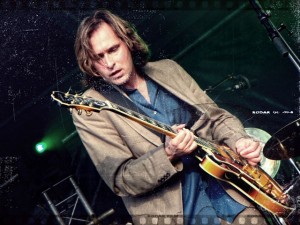 Every time I come to CA I am really impressed with the great musicianship and talent there. I always use California musicians when I come out there. It’s stimulating and fun to work with such great local musicians and keeps me fresh and on my toes. I learn a lot.
Every time I come to CA I am really impressed with the great musicianship and talent there. I always use California musicians when I come out there. It’s stimulating and fun to work with such great local musicians and keeps me fresh and on my toes. I learn a lot.
SoCal is a very tough market, but there are some serious blues fans. Cadillac Zack is a great promoter in SoCal, and it’s because of him that I’ve played there 4 years running and been able to slowly build an audience.
In the Bay Area, the market climate is better. There is a bigger audience, and it’s less of a complete buyers market. They have their own tradition of blues in CA and it’s filled with great players with great careers. I will say, it drives me crazy when I see young Chicago guys modeling themselves after west coast musicians– perhaps because the west coast musicians are better at business and promotion and sort of became the dominant style for awhile, so of course people around the country including Chicago look to them as an example. But to my way of thinking, if you’re a young player in Chicago, why not just focus on the Chicago greats like Sammy Lawhorne et al? That’s what I did; every note I ever played was Chicago, Chicago, Chicago for years and years.
You are also about to head to Europe in January and you are this very moment, in Japan. Are the audiences receptive to blues music?
The audiences are small but very knowledgeable, loyal and enthusiastic. It’s a true pleasure and a privilege to work here in Japan and in Europe. I quit music for about 8 or 9 years in the aughts and came back January of 2009. Since then I’ve gone to Europe, often for a month or so, 8 or 9 times– I have good fans and know great musicians in many parts of Europe. The musicians here in Japan are great too! Japan is pretty much new territory but the blues fans are really passionate. It’s my hope to start working in South America, and to work more in Japan and Asia in the future as well.
Last question–how many times have you played “Sweet Home Chicago?”
Over 1,000 times. I play it every night on the road and on-demand at home. I will honestly tell you, I never get tired of playing it, and I never play it the same way twice. It’s fun to include the audience with it and other songs too. The key is to include the audience however you can in a real way. Playing blues is about connecting with people and these classic songs are all about that in a simple and happy way. I’m sorry that’s not really what you asked me! Here’s another thing I like about it– if you’re gonna play a song everybody knows, you better play it great! Because they know and appreciate a great performance of a classic song like that or “Stormy Monday”. To be honest I cannot say all these glowing things about “Mustang Sally”—
rockinjohnnyband.com | fb | YouTube | buy
Latest posts by TJ Staff (see all)
- Song premier: Brooke Graham – “Merryachi Christmas” - October 31, 2022
- Sean Devine’s Here For It All - September 7, 2021
- Video Premier: “No One Gets Pulled Over on Christmas Eve” (The Smoking Flowers) and “Santa Claus is Dead” (Dee Oh Gee) - December 22, 2020
